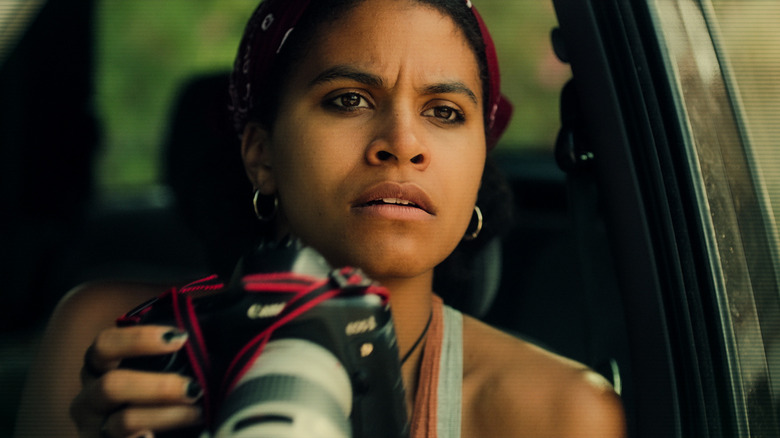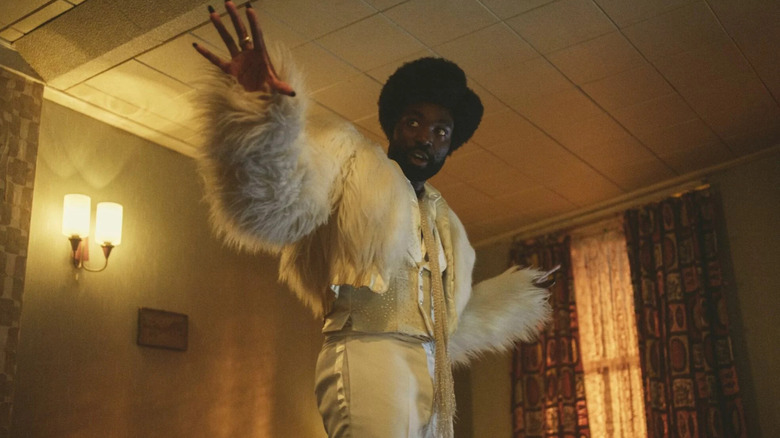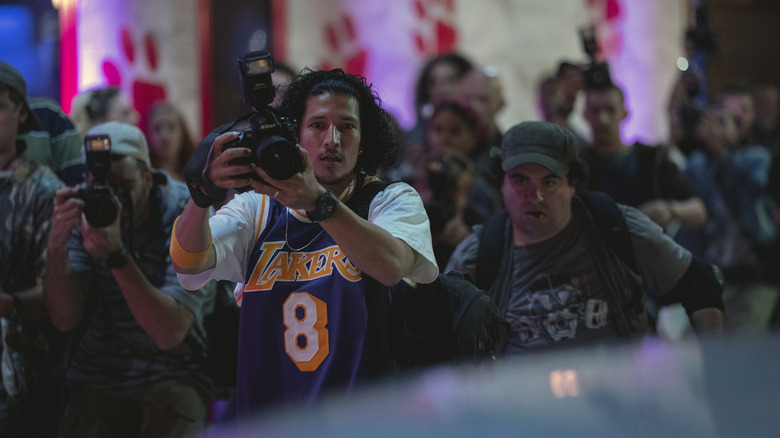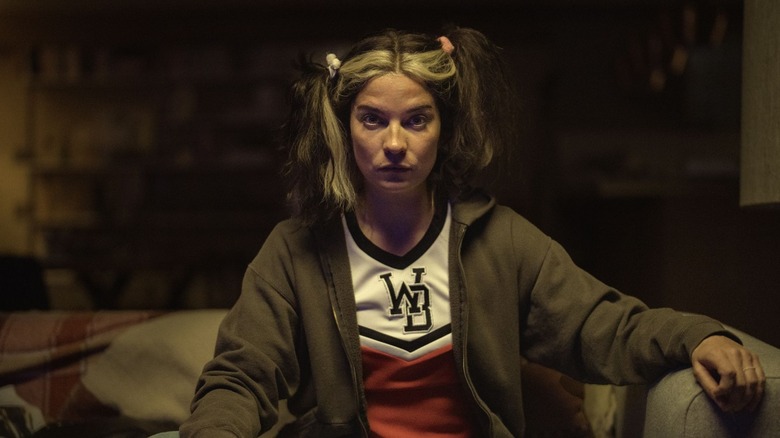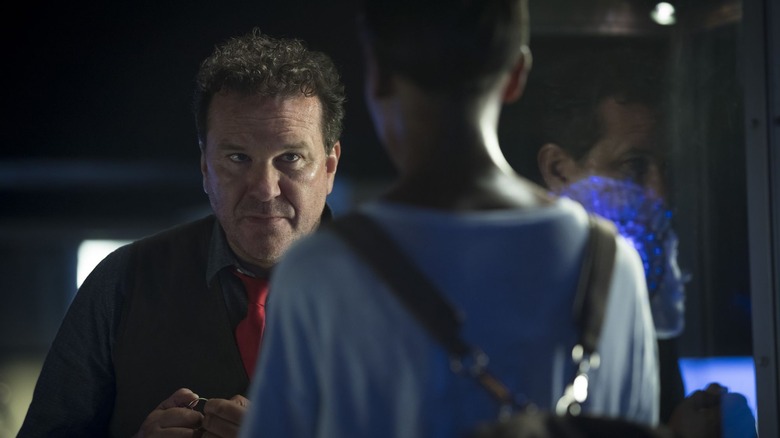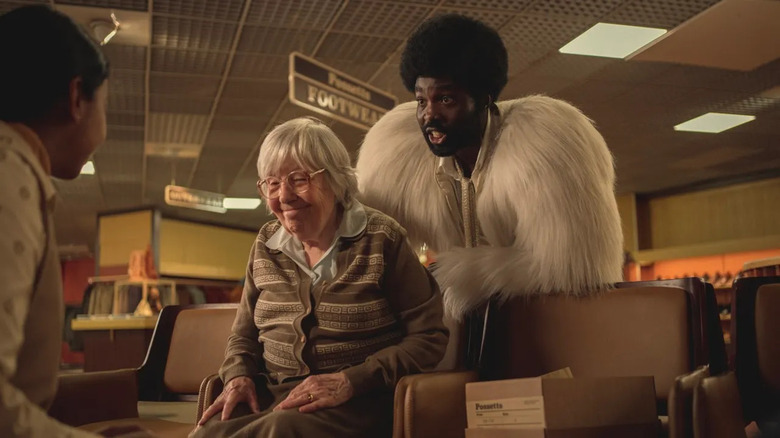Black Mirror Is No Longer A Science Fiction Show, And That's The Best Possible Choice
People love to talk about the exact moment where a popular show "jumps the shark," and when it comes to "Black Mirror" season 6, there's one clear episode fans are pointing to: "Mazey Day." The season's fourth episode starts off as a straight-forward story about a conflicted paparazzi photographer Bo (played by Zazie Beetz) trying to get a $30,000 photograph of a troubled young celebrity.
Throughout the first half of the episode, viewers were probably wondering when the technology-related twist would come into play. After all, even though not every "Black Mirror" episode has a distinctly sci-fi twist — "The National Anthem" and "Shut Up and Dance," for instance, were both contemporary stories — technology did always play a crucial role of some sort.
"Mazey Day" took a sharp left turn, however, and revealed that the celebrity Bo was trying to find was actually ... a werewolf. Not some sort of mechanical werewolf created in a lab, but an actual, magical werewolf. The final act of the episode is a supernatural horror sequence where Mazey the Werewolf goes on a murder rampage, and it can't help but feel a little silly. The episode is currently the lowest-rated installment of the entire show on IMDb, and is almost universally placed last on all the season 6 episode rankings you'll find on the internet. Clearly, some feel that this shift into the supernatural is a bridge too far for "Black Mirror," but there's no denying it's an effective shake-up for the series.
An intentional shift
"I definitely approached this season thinking, 'Whatever my assumptions are about 'Black Mirror,' I'm going to throw them out and do something different,'" showrunner Charlie Brooker said in a recent GQ interview, and now we know he wasn't just talking about switching up the tone or plot structure. The episode after the werewolf story, "Demon 79," centers on a young woman who unexpectedly bonds to a chatty demon who needs her to kill three people to stop the apocalypse. It's an episode that feels something out of "The Sandman" or "Good Omens," definitely not something we'd expect from a show like "Black Mirror."
That may sound frustrating to some fans, but it's also a response to a common complaint that the show keeps repeating itself. Especially after the mixed reception to "Black Mirror" season 5, it's common to hear viewers wonder if the show's run out of ideas, if there's no tech-related story left to base a fresh, compelling episode around. "I got a bit bored of writing [episodes where it] pulls out to reveal that they're all inside a computer, so one of the things I wanted to do was really shake up what the show is," Brooker explained.
There was a lot of online jokes at Brooker's expense earlier this month when he said he'd asked ChatGPT to write an episode for him, and it ended up writing an uninspired mix of previous concepts. "How is that different from the last Black Mirror episodes?" was a common negative response to the news. But at least no one can accuse the show of this issue now. "Black Mirror" season 6 is definitely not doing the same old thing this time around.
It's still Black Mirror
The most convincing argument against the supernatural turn is that magical elements don't reflect quite as much on humanity. The robot dog in "Metalhead" is scary not just because it's dangerous and mysterious, but because we know that humans invented this thing for some nefarious purpose. Meanwhile, humans didn't invent werewolves or demons; at first glance at least, there's no human hubris to be commented on with the reveal that Mazey Day's been bitten by a werewolf.
But much like how the tragic events in so many other classic "Black Mirror" episodes are ultimately self-inflicted, most of the characters who find themselves being chased down by the werewolf only end up in such a horrific situation because of their own self-centered decisions. It would've been so easy for Bo and the other shameless paparazzi photographers to simply mind their own business, to not violate Mazey's privacy for their own financial gain — but they didn't. Like plenty of "Black Mirror" protagonists before them, these characters committed the initial sin and were poetically (if disproportionately) punished for it.
The episode's final scene is as cynical and thematically on-point as "Black Mirror" has ever been: Bo gives Mazey the gun to shoot herself, and she photographs the tortured celebrity in her final moments. Bo will surely have zero trouble paying her rent after this night, but she's gotten her big break at the cost of her own soul, the lives of her friends, and the lives of all those innocent people at the diner. Bo had the capacity to change and leave this exploitative line of work, but in the end she gets pulled back in. The tech connection may not be as strong, but this is still a classic "Black Mirror" ending.
Magic and technology: Not so different
The first real sign of the supernatural turn in season 6 came as early as the premiere, when Joan is about to destroy the machine that creates the TV show about her. Streamberry's CEO warns her against this, describing the machine as so advanced and powerful that it's "basically magic." She's not exactly lying: once technology reaches a point where it's as advanced as what we see in "Joan is Awful," is it really all that distinguishable from the supernatural? The only difference between a werewolf and a cell phone is that there's a scientific explanation for how cell phones are made, but do most of us have any real understanding of that scientific explanation? No, not really.
As far as the average person's concerned, the stuff that goes into making sure computers work is just normalized magic. Even with old-timey instruments, the explanations for technology are still a little baffling: it's hard to watch a video of a 1903 phonograph in action, where sounds are recorded purely through scratches on a rotating wax cylinder, and not think of it as supernatural. Even with technology this simple, the fact that it works at all still feels otherworldly.
With that in mind, is it really that jarring for "Black Mirror" to go full supernatural for its final two episodes? Do we understand Gaap of Misophaes, the titular demon of "Demon 79," any less than we understand how Robert Daly in "USS Callister" was able to upload people's entire consciousness onto his computer just from a scrap of their DNA? It's understandable that someone might have trouble adjusting to the genre shift in season 6, but the fantasy elements don't actually function much differently from the show's usual sci-fi premises.
Limited by its genre
Although season 6 was this show's first official foray into fantasy, it's also worth noting that season 4's "Black Museum" is basically a 70-minute-long fairytale. The episode's villain, Rolo Haynes, might actually be the literal devil. He keeps approaching desperate, suffering people and offering them quick solutions to their problems, only for those solutions to have a deadly catch that makes the people involved regret ever taking up his offer. He appears to have no other purpose in life outside of pushing people to take forbidden fruit and watching as they suffer the consequences.
The episode's often been criticized for its many plot holes — for instance, the idea that the doctor in the first segment would be allowed to take his pain-feeling machine home with him doesn't hold up to much scrutiny — but they're not really meant to be taken at face value in the first place. All three main segments have that fairytale logic to them; just like you're not meant to question why Little Red Riding Hood somehow doesn't realize her grandmother's been replaced by a wolf, you're not really supposed to dwell on how the couple in the second segment (where the husband lets his wife's consciousness inside his head) should've seen the obvious downsides to this technology from day one. You're not supposed to take these mini-stories as literally as you would in the other episodes.
"Black Museum" takes the guise of a sci-fi story, but it's painfully clear in this episode that Charlie Brooker wanted to go full fantasy. In season 6, he finally can.
Becoming more like The Twilight Zone
Although Brooker's show has often been considered a modern day "Twilight Zone," the old CBS series always had the advantage of a wider array of topics to choose from. Meanwhile, it's been clear since season 4 that Brooker's found the limited tech focus of his show to be a weakness rather than a strength; you can only write about technology so many times before it starts to feel a little repetitive. When the show used an uploaded consciousness storyline three times in season 4 alone, it'd become clear that the show would either need to expand its focus or it'd run itself into the ground.
Admittedly this new development towards the supernatural can be a little disappointing, considering that it presumably shouldn't be that difficult to think of stories based on tech-related issues "Black Mirror" hasn't covered yet. With the rise and fall of crypto-currencies, with AI threatening to replace countless people's jobs, with all the various tech solutions being proposed to combat the climate crisis ... It does feel like there should be plenty more to work with.
But going into season 7, "Black Mirror" will be free to go in any direction it wants. Not only can it still cover those untouched areas of modern tech trends, but it's also free to move away from them if that's what the writers think will make for a better story. The definition of a "Black Mirror" has expanded dramatically with season 6, and although the process was certainly a little jarring, it might very well be for the best.
